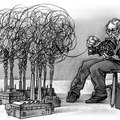From The Economist print edition
| |
 | |
Softbank's latest reinvention, as a mobile firm, proceeds apace. But the company's ability to churn through cash has not changed
AT THE height of the dotcom mania seven years ago, Softbank's stockmarket value hit almost $200 billion, making it very nearly the highest-priced company in Asia—not bad for a former software distributor floated only six years earlier. At the time the company had grown to oversee a vast and chaotic spread of internet investments in America and Japan. Its founder and head, Masayoshi Son (pictured above), who owned 38% of the company, looked as though he might overtake Bill Gates as the world's richest man. For young Japanese entrepreneurs, “Son-san” was more than just an adversary to Japan's buttoned-up corporate world; he was the messiah for a new age.
Times change. Mr Son's early investment in Yahoo! was a masterstroke. However, though Softbank still has a controlling stake in the valuable Yahoo! Japan, the country's biggest internet portal, most of its other investments have proved duds. Softbank's shares change hands at just under ¥3,000 ($25) compared with ¥198,000 at their peak. Foreign hedge funds think that this still values Softbank too richly, given its huge debt and complex corporate structure; they have borrowed Softbank shares to sell, in the hope of picking them up more cheaply after a plunge. The contrast with Japan's retail investors could not be starker. Mr Son is their hero. Thanks to them, Softbank is still the stockmarket's most heavily traded company. Some analysts who have issued critical reports on the firm have had to resort to bodyguards to protect themselves against angry shareholders.
Since the bubble burst, Softbank has reinvented itself at least twice, first as a fixed-line telecoms and broadband firm, and now that scheme has lost its shine, as a mobile-phone operator. A year ago it bought Vodafone's struggling mobile network in Japan. Rebranded Softbank, it is the smallest of Japan's big three mobile operators, with 16m out of 100m-odd mobile customers. At long last, Softbank has a business with scale and a sizeable customer base.
The business that Softbank acquired, for ¥1.8 trillion, was in awful shape, as a result of Vodafone's misreading of Japan's mobile market, one of the world's most sophisticated and a pioneer of third-generation (3G) services. In particular, Vodafone attempted to exploit economies of scale by offering the clunky 3G handsets it was selling in Europe to Japanese consumers too. To make matters worse, Vodafone underinvested in its Japanese 3G network, so coverage was poor.
Soon after the takeover, Softbank dramatically wrote down the value of Vodafone's fixed assets—raising the question of why it had paid so much for them in the first place. Undaunted, the new management began spending anew in the hope of setting things to rights. To improve coverage, it promised to increase the number of base stations from 25,000 to 46,000 by March this year. Since last autumn it has rolled out 30 new handsets.
Last October, new rules allowed people to keep their mobile-phone number when they change operators. In response, Softbank offered a series of cut-price tariff packages, including the offer of free calls to other Softbank subscribers. And it gave its customers the chance to pay for their handsets in instalments—an especially alluring innovation, since mobile firms in Japan do not offer customers subsidised handsets, unlike their counterparts in Europe. Executives at NTT DoCoMo, Japan's dominant mobile company, admit that the industry was caught off-balance by such promotions.
Whether they have benefited Softbank is another matter. Such tactics work best in markets with high rates of churn, where customers jump readily from one operator to the next. But fewer than 5% of users have switched so far—a fraction of the churn-rate of Europe. That is partly because e-mail via mobile phone is hugely popular in Japan, and e-mail addresses linked to phones are not portable. And it is partly because each Japanese network has its own standard, so customers must buy new handsets when they switch.
Softbank has managed to reverse Vodafone's steady loss of subscribers—but at a cost. Revenue per subscriber is falling faster than subscriptions are growing, a problem that afflicts all operators save the second biggest, KDDI. That should spell lower revenues overall.
It is remarkable, therefore, that Softbank is reporting improved profitability at its mobile business. For instance, where profit margins under Vodafone were just 3.2%, they more than tripled to 11.7% during the new management's first two months last summer. They have since slipped a bit, but the leap has rekindled awe at Softbank's aggressive accounting.
The latest innovation seems to involve the handsets Softbank is selling on instalment. Analysts reckon it is booking all the revenues from the sale of each handset up front, even though the cash is to be received in instalments over up to two years. Softbank, in effect, has created a leasing business. Over the long term, that should have no impact on the company's cash flow, but in the accounts it could boost operating profit in the short term. The publication in a few weeks of Softbank's annual accounts for the year to April may cast more light on the matter.
In the previous financial year Softbank put an end to years of operating losses and has since seen operating profit grow each quarter. Indeed, over the past seven quarters, Softbank has reported a cumulative operating profit of ¥260 billion. But it is cash that services debt, and Softbank has a lot of debt—a net ¥2.4 trillion at the latest count, over eight times more than equity. Much of its cash is being swallowed by investments in Softbank's broadband, fixed-line and mobile businesses—including all those extra base stations that Softbank promised last year, but had not yet completed by its March deadline. As a result, free cash flow (net income adjusted for things like depreciation and capital expenditure) is estimated to have fallen ¥80 billion into the red over the same period.
Softbank is still bleeding cash, in other words, which it must back up either with fresh injections of equity or debt or by selling something. Since Softbank's flotation in 1994, its ability to destroy value has been prodigious. In all, it has received more than ¥3.2 trillion from investors and has spent about ¥2.8 trillion of that in operating losses, investment losses and capital expenditure. Although Mr Son's machine is remarkable for sucking cash in at one end, it is also remarkable for spitting very little of it out at the other.





